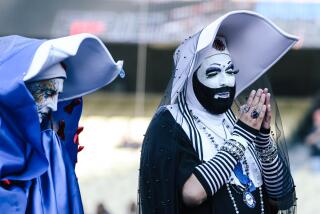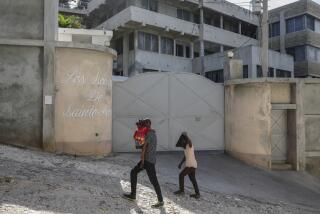The Secret Sisterhood : To survive Communism, young Hungarian nuns led a double life. They were forced to deceive family and friends in a world of danger.
Maria Kremlicska took her vows as a nun in secret. There was none of the traditional group ceremony. Rather, the 29-year-old woman got up from her pew during a Mass in Budapest in 1973 and quietly entered a darkened confessional on the side of the church. There a priest administered her vows of poverty, chastity and obedience as a Sister of Social Service.
And until the collapse of Communism in 1989, Kremlicska lived as an underground nun in Hungary, keeping her secret from family and friends in an atmosphere of distrust and danger.
Kremlicska, who described her double life during a visit here, grew up in a time when contact between nuns and young women--potential recruits--was forbidden. During the Communist era--from 1949 to 1989--the government permitted those who were already priests or nuns to remain so but confiscated church property, disbanded convents and demanded they recruit no new members.
It was much the same throughout the Communist-ruled countries of Eastern Europe.
“Several priests and nuns spent some years in prison because they were religious,” recalls Kremlicska, who was one of 60 women in Hungary, Romania and Czechoslovakia to join the order during those years--a fact not recorded or known for certain in Hungary at the time. Members tended to know only a few others. (The order’s convent in Buffalo, N.Y., kept the records.)
This summer, Kremlicska, now 48, and Sister Iren Tari, 34, arrived in Los Angeles to visit their community here and study English.
One recent morning they sat in the convent parlor and, with some help from Sister Jeanmarie Renfro, the L.A. center’s archivist and historian, talked about becoming nuns in a land where people were technically free to practice religion, but at a price. Those who did were looked down upon, at best, often regarded as unpatriotic.
Maria Kremlicska came from a family that regularly attended Sunday Mass and paid for it: her father stalled in his job as an expert mechanic without a promotion or raise; her older sister, an excellent student, failed to secure a place in the university.
*
Kremlicska became aware of her desire to be a nun when she was 18, working in a print shop and taking night school courses: “I had a big feeling inside, an invitation,” she says, struggling to find words in English. “I would like to be a sister. I lived with this big, beautiful, very nice secret alone. I did not share it. I wanted to live totally for God, but I didn’t know how.”
She kept her secret for three years. At 21, she made a pilgrimage to a shrine outside Budapest. The priest, a family friend, introduced her to a Sister of Social Service who had taken her vows before the Communist takeover. Kremlicska confided in her.
Convinced of her sincerity and trustworthiness, the nun led her to the superior of the order in Budapest, who accepted her.
Traditionally, the novitiate is a sequestered period of several years in a convent during which novices pray, receive spiritual guidance and study religious life. Only after this do they take vows.
Instead, Kremlicska’s novitiate was work as usual at the print shop and later at a hospital as a dietitian, followed by a weekly meeting with the mother superior.
“It was a difficult time. . . . We had secret contact, in a park, someplace outside, after work for two hours. We would speak of the life of the sisters, the history of the order, religious life, our mission.”
She kept her identity as a nun from her parents, lest she endanger them or herself.
Early on Kremlicska told them she’d never marry: “They thought it was just until I found someone,” she smiles. Then they adopted a “don’t ask” policy, preferring, she thinks now, not to know. Her mother died of cancer 12 years ago. She only told her father in 1988.
*
Not surprisingly, in a system of life rife with informants and spies, Kremlicska was called in for questioning by the Secret Police several times during the 1970s. She had been watched, they told her.
“The first time, I was very naive. I did not realize how dangerous it was. I answered all their questions truthfully.” Only when they asked about vows, she says, did fear strike. “I denied I am a sister.”
She refused to sign a written statement, despite threats that “they’d take me to prison and take off my fingernails.”
Five months later, the police called her back. This time she was prepared. Her superior had counseled her “not to tell the truth. She told me they are not right, that this life is between God and me.”
Terrified, nevertheless, during the interrogation, she says, “I began to pray inside.” The interrogator told her to stop.
“Right away, I felt inside they lost their power over me. I had more courage. They told me to stop this life and give up contact with the sisters.”
Indignant, she told them she would not stop: “ ‘I am not doing anything not good for the people.’ They were angry and yelled at me and let me go.”
*
Iren Tari grew up in a village where life was not so strictly controlled and it was fairly easy to practice religion. She belonged to a religious youth group that met twice a week. The teacher was her role model. Freedom was relative, however, and only years later did Tari discover that her role model was a nun.
While a university student in Budapest, Tari was put in touch with a Sister of Social Service, again in secrecy, and began attending weekly discussions among a small group of women. It was never openly acknowledged as what it was--a novitiate.
From the start, Tari says, “I felt, ‘I am home.’ ”
Her superiors never told her what work she should do.
Tari says new nuns like herself were vague about their mission. They just followed God’s invitation.
“We called it a ministry of presence,” Renfro explains. “Our mission was to just be there: ‘If we are here, Jesus is here.’ ”
Usually, the order devotes itself to social work, in social service and activism for social justice. This was impossible under Communism.
“Now everything is open,” Tari says. “We are free, but we need to find our purpose now. It is different. How can we live now, not just personally but as an order? It is a problem now.”
Redefining themselves is not a problem just for nuns who lived under Communism. For different reasons, all nuns have been facing similar experiences since the Second Vatican Council in the 1960s. When Pope John XXIII called upon religious orders, many of them following a way of life established in the Middle Ages, to examine and renew themselves, great upheaval followed.
Kremlicska and Tari both say they were hazily aware of Vatican II at the time, more familiar with the changes it brought to the liturgy as it moved from Latin to the vernacular, their sense of its effect on religious life dim at best.
“We were more concerned with survival,” Tari says.
Ironically, while Kremlicska and Tari were risking their lives to live as nuns, nuns elsewhere were questioning the rules of religious life. Some renounced their vows and walked out the convent doors. New vocations declined sharply. In the United States, for example, there were about 180,000 nuns in 1963, about 143,000 10 years later. Currently, there are about 99,337.
Their own order, a small one founded in Hungary in 1923, had about 485 members in 1950; today there are 374 at its three autonomous centers in Los Angeles, Toronto and Buffalo. (They hope to re-establish Budapest as a center soon.)
Talking about the upheaval since Vatican II, Renfro predicted that the nuns of Eastern Europe may have led the way to the future: “Religious nuns have defined themselves by what they wore, the work they did, the convent life they shared. In Communism you had to wear clothes like everyone else, a convent was no more than two or three people and your work was whatever job you had. They reorganized in small groups and developed a new way of being Christian. Communism forced our sisters to create what will be the future structures of religious life.”
That is how Kremlicska and Tari see it. Both use radical to describe themselves under Communism, saying it empowered them.
“It was the opposite effect than they wanted,” Tari says. “We found a new way. I do not know if the United States will find a new way or not.”
More to Read
Sign up for Essential California
The most important California stories and recommendations in your inbox every morning.
You may occasionally receive promotional content from the Los Angeles Times.










